Edited by Livraria Almedina with scientific coordination by the Legal Cooperation Institute of FDUL, the Collection “African Legal Studies” represents, in all 24 volumes already published since 2004, the most significant legal literature collection on current African topics in Portuguese language. It encompasses, alongside monographs and Master’s and Ph.D. thesis, handbooks for teaching Law in various fields, from Civil Law to Administrative Law, as well as works with contributions from several authors on specific topics of African Law.
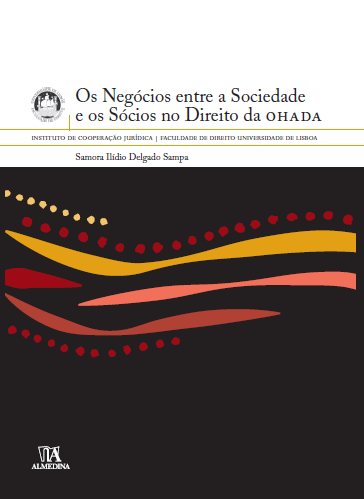
Agreements between the company and its partners in the laws of OHADA
Author: Samora Ilídio Delgado Sampa
Year: 2014
Summary: The importance of the subject speaks for itself: in addition to the specific features of the system enshrined in the OHADA Uniform Act relating to agreements between the company and its partners, the topic of supervision of actions of the directors or managers of the companies, namely – but not only – depending on the capacity of the latter or of managing partners to obtain benefits to the detriment of the company, of the (remaining) shareholders and company’s creditors, is among the most interesting subjects in contemporary Company Law, largely fueled by the often late identification of multiple situations of manifest abuse. The author is not restricted to the study of the specific system of businesses between the company and the shareholders, as is governed by the Uniform Act; instead, he places the issues and problems in the broader context of Private Law in general and Commercial Law in particular, with frequent “incursions” in Civil and Banking Law. In between, the author addresses important issues of Company Law such as capacity, lifting of the corporate veil, shareholder status, the status of creditors of the company, stocks, etc […]
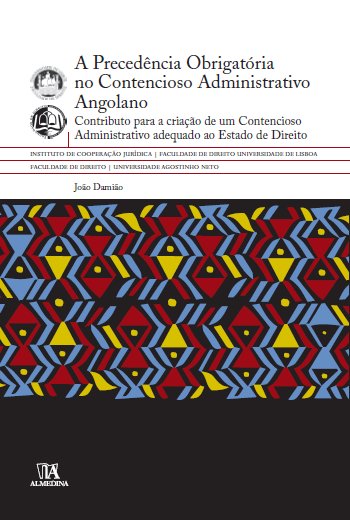
Compulsory precedent in Angolan administrative litigation
Author: João Damião
Year: 2014
Summary: It is with particular and intense satisfaction that I write this foreword to Compulsory precedent in Angolan administrative litigation. It is a contribution to the creation of an Administrative Litigation system in conformity with the Rule of Law, by João Damião, who was recently awarded his LL.M. Indeed, as legal practitioners receive multiple requests from a professional point of view, the years-long investment in the preparation of a master’s or Ph.D. thesis may seem to them, in a short-term analysis, as an option not worth betting on. The bet made by João Damião LL.M. shows he has a different reading, even more so supported by his position as Ph.D. in Law researcher at the University of Lisbon School of Law, advised by Professor Marcelo Rebelo de Sousa, with which the Author presents himself in the opening pages of this work. The merit of having achieved approval in that initiation rite is exclusively his. […]
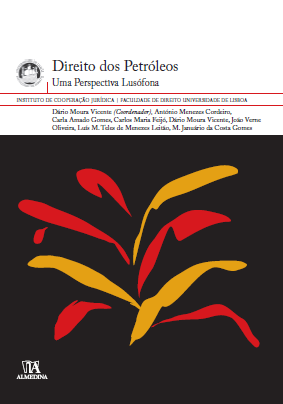
Oil and Gas Law – A Lusophone perspective
Coordination: Dário Moura Vicente
Year: 2013
Summary: This volume brings together several studies on the subject of Oil and Gas Law. A common trait to all of them is that they result from the teaching and research carried out by their authors in Angola and Portugal, especially within the framework of cooperation established between the University of Lisbon School of Law and the Agostinho Neto University Faculty of Law. Notwithstanding the enormous relevance recently conquered in several Portuguese-speaking countries, particularly in Angola, within Legal Sciences, Oil and Gas Law remains unchartered territory to academics. That is the fundamental reason underlying the publication of this collection.
Oil and its derivatives account today for a very substantial part of the gross domestic product of several of those countries, especially Angola, Brazil and East Timor. Even Portugal, which has no known oil resources, has long equipped itself with a refining industry of international relevance. A significant part of the energy consumed in these countries comes, on the other hand, from such products. Therefore, it is not surprising that such goods are among those that weigh the most in the trade balance of said countries. The prospect of its depletion, even if only in the long run, and the demand growth have led to the constant increase of its value and as a consequence, of the relevance of its contribution to national economies. […]
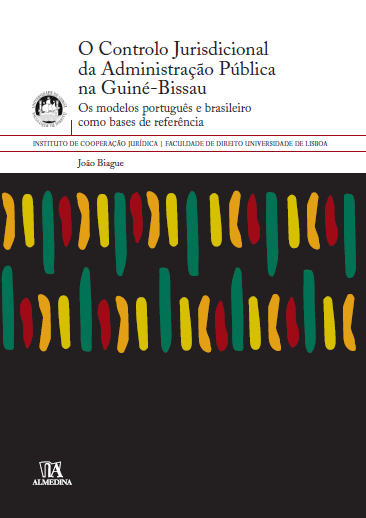
Judicial review of the Public administration in Guinea-Bissau
Author: João Biague
Year: 2013
Summary: In this book, João Biague reflects both de jure condito and de jure condendo, on the system of judicial review of the administration in his country: Guinea-Bissau. As is clear from the book, the Guinean Administrative Justice is still poorly structured and it remains more the result of the semantics of scattered legal texts, sometimes incompatible, than that of a rooted, consistent praxis. […]
This book represents a real contribution to the advancement of the actual implementation in Guinea-Bissau of an effective system of administrative judicial protection, built with moderation and realism. Finally, we express the hope that the Guinean legislator can soon take the necessary steps to overcome the current standstill regarding the seat of administrative justice and that the Guinean Legal Order be endowed with administrative procedural legislation, which is an indispensable legal requirement for the effectiveness of protection. […]
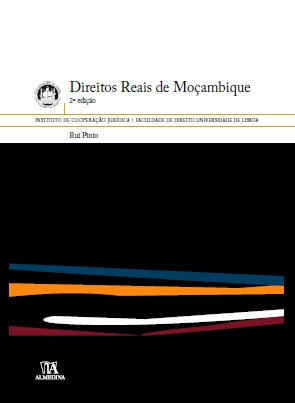
Mozambican Property Law (2nd edition)
Author: Rui Pinto
Year: 2012
Summary: It is a great service you provide to the legal culture. We believe that this is the first book with a scientific approach to this subject. Thus, is has the great merit of laying the first stone, taking some risks, as all teachers, but providing the public with a solid foundation. Mozambican Property Law is the result of several years of teaching Property Law at the Lisbon School of Law, between 1992 and 1995 and at the Faculty of Law of University Eduardo Mondlane, in Maputo, within the framework of the cooperation mission in Mozambique, at the service of the Lisbon School of Law, between 1997 and 1999. This book is simultaneously helpful and a contribution. Due to its organization, it helps the Law student in finding the information he/she needs faster. It is a contribution to the Mozambican colleagues with whom we had the honour of working, through consideration on subjects such as the role of registration or possession in Mozambique or the operation of accession in terms of use and enjoyment. In any case, let us draw at least from the Mozambican Property Law the usefulness of the contributions made in order to shed light on what we do not know and let us recall the latin motto “laborando vinces”. […]
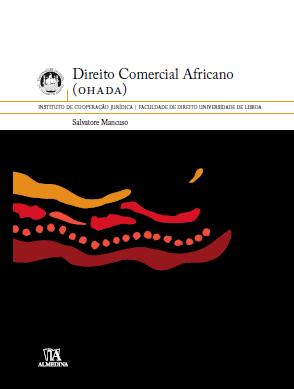
Commercial African Law – OHADA
Author: Salvatore Mancuso
Year: 2012
Summary: The work of Salvatore Mancuso reveals his passion for Africa and for the study of its law, which led him not only to collect the testimony of the Italian tradition of legal African studies, but also to place it, as professor at the University of Macao, on one of the most interesting “new frontiers” of globalization: the growing relations between China and Africa, whose meeting between the two legal cultures also constitutes a new frontier of law in general and of comparative law in particular. Professor Marco Guadagni. This is why, in our view, within the OHADA framework, there must be a balance between the desirable unity and the irrepressible diversity of its Member States’ Laws: it is certainly important to eliminate unnecessary barriers to the movement of people and goods and to foreign investment, as well as to promote the certainty of Law and the stability in legal relations in diverse locations; but without making the national legal systems lose their individuality or their characteristics. This book by Salvatore Mancuso is certainly an important contribution towards achieving those goals, keeping in mind the precise framing of the OHADA Uniform Acts within the context of legal pluralism in Africa, and the existence of an interesting thought on the role of customary rules in contract law throughout this continent. […]
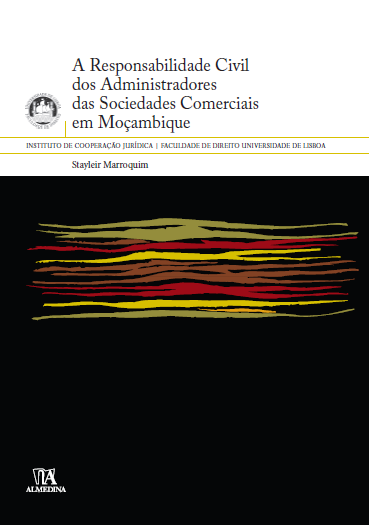
Civil Liability of Commercial Companies Directors in Mozambique
Author: Styler Marroquim
Year: 2011
Summary: Directors’ liability is a superior means to contain companies within the boundaries of the Law. In addition, it operates as a sensitive area, on which basis the rules relating to corporate governance are perfected. In the current historical moment, marked by globalization, by the weakness of the international markets and by the difficulties in establishing a global governance, all this becomes increasingly relevant. Due to the laborious generosity of its people, its extent and richness of its territory and the position at the hinge of a crossroads of cultures and traditions, Mozambique stands as an essential hub in the Portuguese-speaking systems and in Southern Africa. Served by a legal system in continuous improvement and by a generation of young scientists, Mozambican Law expresses the synthesis of the values which intersect it. In this light, we strongly welcome the recently published work of Stayleir Marroquim LL.M. The subject is pertinent. The work is developed consistently within the complex, albeit compelling, rapport between Company Law and Civil Liability Law. Basic intricacies of Mozambican Law are at play, in fundamental terms for future case law. […]
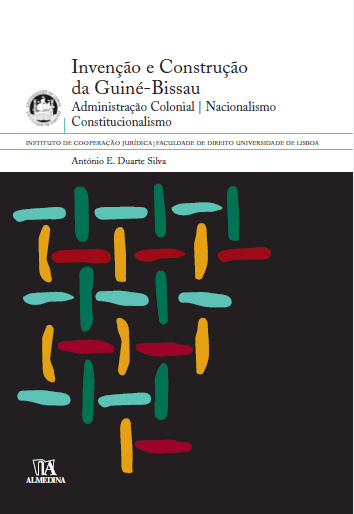
Invention and Construction of Guinea-Bissau
Author: António E. Duarte Silva
Year: 2010
Summary: With this work, the Author not only reaffirms himself as a leading expert on Guinea-Bissau matters, in the political, constitutional, social and legal aspects; throughout the book, there is indeed the expression of restlessness of someone who loves Guinea and believed in its future and to whom the turmoil of the path of the young State is immersed in amazement. […] If, almost like Penelope’s web, the book tirelessly reconstitutes the filaments that, since the late nineteenth century, came together to make Guinea-Bissau what it is today and intersected in the conditioning of its “weaknesses and misfortunes”, the truth is that it is not just about mourning the lost horizons. More than a handkerchief to wipe tears away, we notice in the web the intention of mapping escape routes to the maelstrom, to enter into a new stage of redemptive peace and progress. As well-intentioned as it is, this is a hope we cannot cast out. But to be achievable, hope will have to take into account the obstacles to get around them. […]

Human Rights and Protection Mechanisms
Author: Marcolino Moco
Year: 2010
Summary: The monograph of Marcolino Moco LL.M. on Human Rights and its protection mechanisms is, it should be emphasized, both an academic work of undeniable scientific seriousness and a testimony of the civic maturity of an African Man clearly committed to create conditions of peace and development for the African continent. In fact, taking into consideration the previous professional career of Marcolino Moco LL.M. and his actual knowledge of the mechanisms of political decision-making at the highest level, the choice of subject and the option for the promotion and defence of Human Rights at this stage of his life have a particular meaning which we cannot fail to highlight and commend. Moreover, in parallel, we cannot help but emphasize the fact that it is a work in the field of Public International Law, when the choice of these subjects is usually residual among Angolan jurists. Indeed, in spite of its undeniable theoretical, but also practical, importance for a State in construction and affirming itself in the subregional space, in the African regional space and internationallly, as Angola is, only a few jurists wish to venture into the legal international fields or even to be open-minded enough to allow themselves to be surprised by its characteristics and potentialities. With the monograph Human Rights and its protection mechanisms, the particular features of the African system are starting to fill a gap in the legal library dedicated to the protection of Human Rights in Africa, with particular emphasis on the analysis of the African Charter on Human and Peoples’ Rights. […]
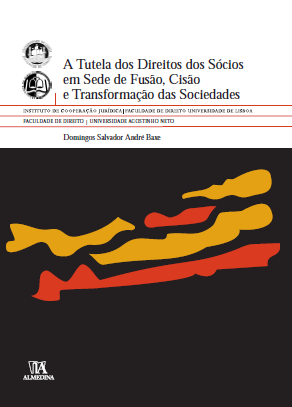
The Protection of the Rights of Shareholders upon Merger, Division and Transformation of Companies
Author: Domingos Salvador André Baxe
Year: 2010
Summary: André Baxes tackles in this book some of the most complicated issues of Company Law. A wide variety of vectors converge in this sort of studies, the position of shareholders versus that of the company/companies, the social interest and the protection of minorities, the nature of succession and the diversity in the figures included in each case… Under this light, the doctrinal perplexities do not facilitate taking a stance. He does so in a clear style, supported by extensive specialized bibliography that involves having dedicated himself intensely to the subject. He demonstrates the capacity to delve into the relevant issues. Thus, he should be praised for having properly considered the issues and for having put forward his contribution to the improvement of the solutions. Furthermore, he does so with sensibility and common sense. […]
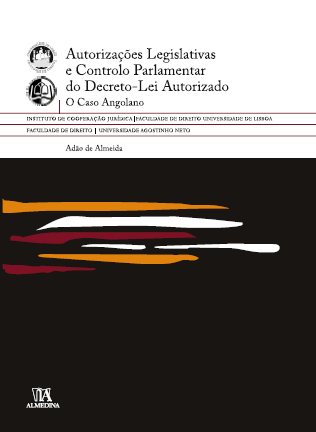
Delegated legislation and Parliamentary Scrutiny of the Delegated Decree-Law – The Angolan Case
Author: Adão de Almeida
Year: 2009
Summary: Delegated legislation is one of the most interesting legal-constitutional doctrines in the relationship between Governments and Parliaments. That is to say, in the functioning of the systems of government. In democracy, the division of powers runs through them – i.e., separation and interdependence between them – and, therefore, the overall limitation of the political power and the effective guarantee of fundamental rights. In addition, of course, to the pursuit of the end goals, of security, justice and economic, social and cultural well-being. In other words, knowing this doctrine – in its nominal and practical proclamation – paves the way for gauging the experience of the system of democratic leadership itself, of its capacity of affirmation and consolidation. Uet another reason to welcome the task carried out by Adão Correia de Almeida LL.M.: scientifically settle a theoretical and practical research that can, and should, shed light on the relevant tracks of the current and future Angolan constitutionalism. The University is, by definition, universal in its vocation and in its freedom to search and create. But it is always rooted in a specific society, whose challenges it cannot ignore or minimize. It is that commendable bridge between the universal and the national that this dissertation seeks to establish. In the proper time. In a way that corresponds to the portrait of the author. […]
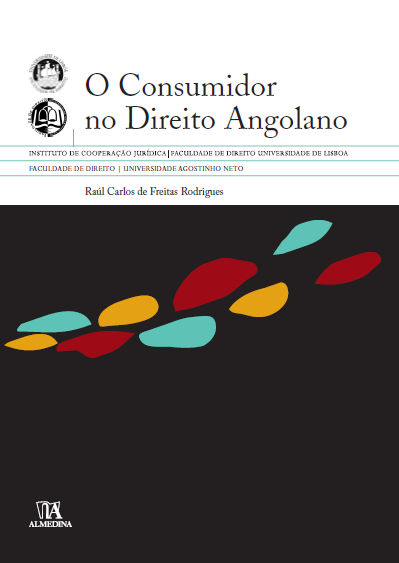
Author: Raúl Carlos de Freitas Rodrigues
Year: 2009
Summary: Raúl Rodrigues ventures into a broad description in which he focuses on the main chapters of Consumer Law. He naturally targets Angolan law, because the study of Law must be specific, but he demonstrates a remarkable knowledge of the general evolution in other legal systems. It should be noted, in particular, his mastery of the legal and doctrinal sources in Portugal and Brazil, which he uses properly, surpassing the obvious difficulties to access the texts. In this sense, the conducted study exceeds the value of the contribution that he brings to the knowledge and analysis of the Angolan situation, as it represents an added contribution to the dialogue and legal coordination between the systems of Portuguese-speaking countries. It is another facet to be noted in his work. The author does not simply describe the Angolan Consumer Protection Act (LDC). He seeks to capture its meaning, approaching theoretical and ethical issues that contribute to its framework. He expresses it right away in the identification of this branch of Law as Consumer Law rather than Consumption Law. We applaud because we cannot forget that the vulnerability of the consumer is at the origin of the very formation of this branch of Law; but which the author extends in the distinction between lack of sufficiency and vulnerability, because there may be vulnerability where there is no lack of sufficiency and these situations should also be included in the scope of Consumer Law. […]
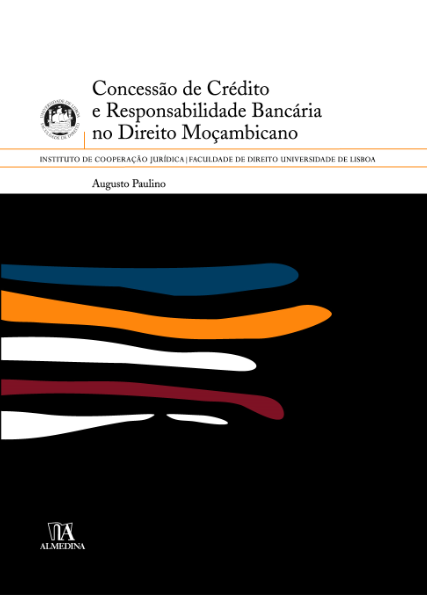
Credit Granting and Banking Liability in Mozambican Lawde
Author: Augusto Paulino
Year: 2009
Summary: The subject, quite complex and sensitive, is of great scientific dignity and of the utmost practical use. The defence of the thesis was earlier than the financial crisis in which we are submerged today, but there were already many doubts and perplexities about the evolution of the banking system. They echo, in some way, right away in the introduction when the author, after mentioning the importance of credit granting not only to companies but also to individuals, aiming to achieve social integration and economic growth, hints at his concern about new financial products that seem to be one of the reasons that led the author to start this research. If it was easy to prove him right at the time, recent events have clearly shown the relevance of the subject, at a time when it is increasingly necessary that jurists explore a subject which obviously is an invitation to a debate by economists, philosophers and sociologists. […]
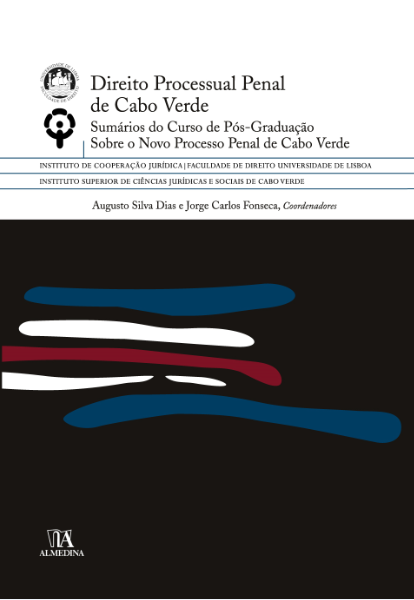
Criminal Procedure Law of Cape Verde
Author: Augusto Silva Dias, Jorge Carlos Fonseca
Year: 2009
Summary: “… The texts published here, despite being developed summaries, differ much, in particular with regard to their physical dimension. Some are more developed and extensive than others, some are more filled with notes and quotes than others. But, regardless of their size and theoretical development, they all seek to cover, in the form of summaries, the fundamental issues of criminal procedure in Cape Verde. The organizers of this volume hope, therefore, that this edition will result in a useful contribution in general for scholars of criminal procedural law and, above all, for those who devote themselves one way or another… to criminal procedure in Portuguese-speaking countries, undeniably linked by a similar legal and cultural matrix or even a common matrix – and, in particular, of Cape Verde…” […]
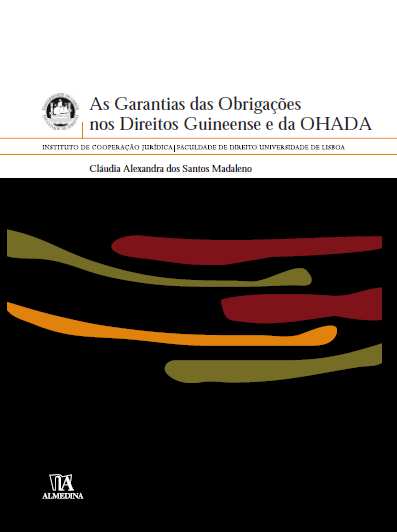
Obligations securities in Guinean Law and in the OHADA
Author: Cláudia Madaleno
Year: 2009
Summary: Cláudia Madaleno was, for five years, Assistant Lecturer at the School of Law of Bissau, within the cooperation framework between this Faculty of Law and the Lisbon School of Law. As a lecturer of “Securities Law” in said Faculty, the author had to implement the OHADA Uniform Act Organizing Securities, an Act which despite already being in force in Guinea-Bissau, was neither studied, nor applied, and it wasactually unknown to the Guinean legal community. Thus, the study of the Uniform Act system had to be linked to the study of the securities system in force in Guinea-Bissau, at the time of entry into force of the uniform law. This work reveals the author’s pedagogical concerns, in a country with deep weaknesses in learning and study conditions. These concerns give the work an additional merit, since the author proved able to fully integrate in the social and academic environment where she worked, leaving an important milestone of her stay at the Faculty of Law of Bissau and on the course […]
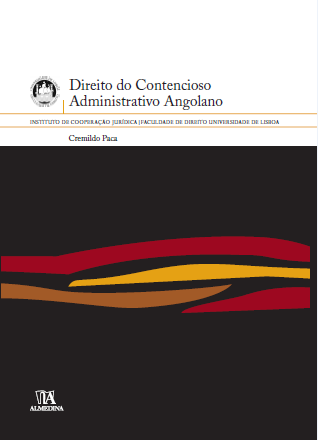
Angolan Administrative Justice
Author: Cremildo Paca
Year: 2014
Summary: Cremildo Paca has addressed the subjects of Administrative Law and Administrative Procedure Law much of his tireless scientific and academic work. These lessons on Administrative Justice are a suggestive example of that work, which confirm the research, the concern to cover the main issues, a desire to remain updated, realism in considering the challenges facing the Angolan legal order and, last but not least, pedagogical quality (both in the arrangement of the themes and in the clarity of their approach). Therefore, the publication of these pioneering and promising lessons is welcomed. Promising, in my opinion, since the author will soon complete his Master’s degree in Legal and Political Sciences, which is an opportunity to confirm the expectations which deserve an adequate scientific sequence. I truly hope this happens. Finally, a word is due to the commitment of all those who have made this publication possible, within the Legal Cooperation framework between the Lisbon School of Law and the Faculty of Law of the University Agostinho Neto. I thank you all on behalf of Professor Manuel Januário da Costa Gomes, who put so much effort into this as in many other publications. […]
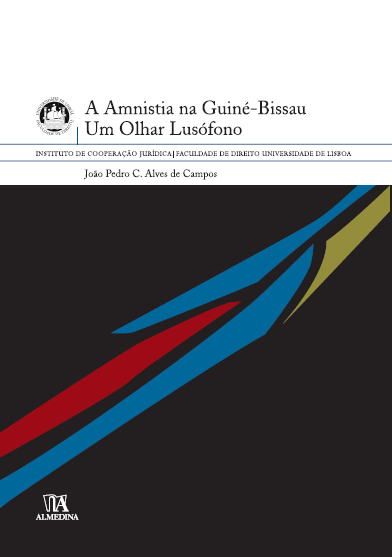
Amnesty in Guinea-Bissau – A Lusophone Perspective
Author: João Pedro Campos
Year: 2008
Summary: The debate of criminal scholars about amnesty is without a doubt important to outline the doctrine, but it should not make us forget that the doctrine’s basis and scope is essentially of a political and, importantly, political-criminal nature. In fact, through amnesty, it was always intended, and still is today, to achieve certain goals, namely those of peace and social reconciliation. Thus, there is an insurmountable limit to the adequacy and effectiveness of the amnesty: it should not be used with regard to crimes whose institutional pardoning may cause, with a reasonable degree of likelihood, general feelings of insecurity, disbelief or loss of confidence in the unscathed validity of the goods and legal rules that protect them, under penalty of denying itself by denying said purposes. The exercise of grace should be anything but a free, arbitrary and capricious activity. The work now published with the other on the amnesty process in Guinea-Bissau, recently developed by the Centre for Studies and Support to the Legal Reforms of the Faculty of Law of Bissau, in partnership with the United Nations Integrated Peace-Building Office in Guinea-Bissau (UNOGBIS) and the National Popular Assembly, is the culmination of intense collaborative relationships between the School of Law and UNOGBIS. […]
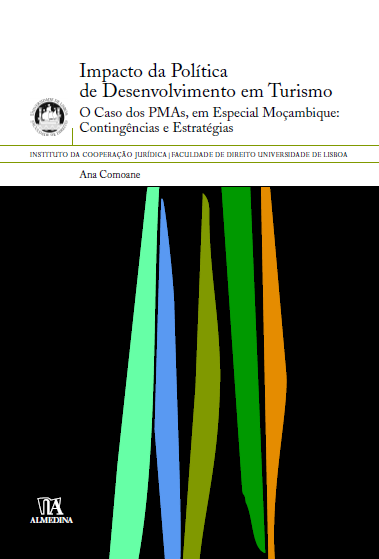
Author: Ana Comoane
Year: 2007
Summary: The interest of the dissertation results, first of all, from the vast wealth of information on the current issue of international tourism and of Mozambican perspectives on this subject and on the concern of addressing it from a comparative perspective, seeking to draw lessons as may be appropriate. However, what is most important is the detailed consideration of the discussed issues, an option that tries to reconcile economic growth with environmental protection within a sustainable development model. The subject has, on the other hand, the clear advantage of placing itself at the centre of modern conceptions and experiences of economic development, based on the resizing of the role of public investment and on the appeal to the international private investment. […]
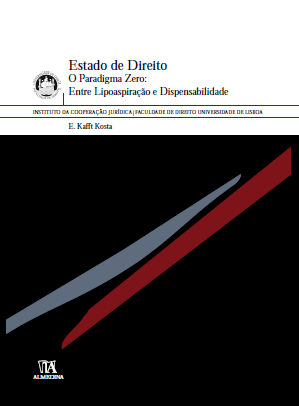
Rule of Law. The zero paradigm: Between liposuction and expendability
Author: E. Kafft Costa
Year: 2007
Summary: This work will certainly become part of the annals of public law doctrine in Portuguese language. […] Choosing as central topic the principle of rule of law as developed by sectors of contemporary doctrine of Western Europe, the Author argues that there are no conditions to sincerely and efficiently transfer it to the territory of a State as Guinea-Bissau. In order to secure at least a few chances of putting them into practice in a consistent manner, the constitutional programme and the ideal representations should be restricted to less ambitious levels than those usually proclaimed. […] Inevitably, not all passages will have the reader’s agreement, in a work wherein the framework of the legal theory focuses on events of contemporary history subject to conflicting views. But, notwithstanding occasional disagreements, we must conclude that we are faced with a work whose importance shall be acknowledged in the future. It represents an undeniable contribution to a syncretic legal view capable of integrating national African Laws in the phenomenon of globalization of the essential legal values without harming the presence of specific social and cultural factors capable of maintaining their authenticity and effectiveness. On the other hand it reflects – in existentially sharp terms – the tenacious search for a solution to the identity crisis and for a project of the generations who, in Africa, followed those who led the fights for national liberation and the search for foundations so these peoples may reunite with themselves in a peaceful and progressive environment. […]
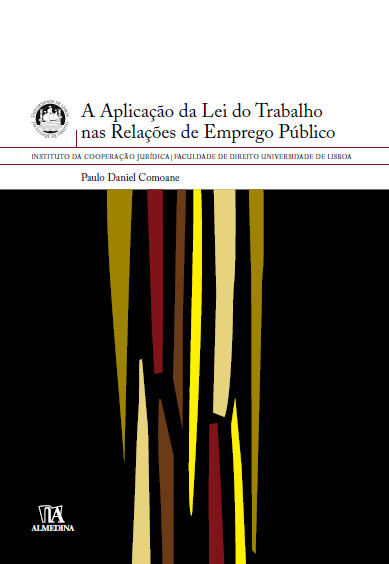
The application of Labour law in public employment relations
Author: Paulo Daniel Comoane
Year: 2007
Summary: The importance of this work needs no justification. Owing to its subject, the topicality and the processing of the legal elements, «The Application of Labour Law in Public Employment Relations» represents a fundamental work to understand the paths and metamorphoses of the Mozambican State. Thus, the paradigms of the private labour law should be understood in light of a specific weighting of the status of State officials and employees. The current issues of privatization of public law and publification of private law are particularly important in this domain. On the other hand, this book does not simply question and solve dogmatic issues, but it contains precise indications for issues related to the legal practice in Mozambique. Finally, the last chapter gives the reader important clues to reflect on the paths facing the Mozambican legislator, reflections which are particularly striking when major reforms of labour legislation and public administration are under way. […]
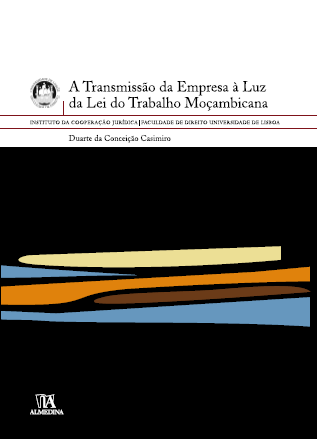
Transfer of business in light of Mozambican labour law
Author: Duarte da Conceição Casimiro
Year: 2006
Summary: A complex subject in the border between labour and commercial law, transfer of business is obviously important, both from the theoretical and practical point of view. The centrality that the concept of business has been acquiring in modern private, economic and tax law, poses delicate legal problems to labour law, assessed briefly herein. The theoretical issues cannot be separated from Mozambican economic reality. And indeed, it is the consideration of the Mozambican legislation, in light of its judicial practice, that acts as a guide in assessing the legal system of transfer of business, especially its effects on individual and collective labour relations. The legal science is increasingly universal. The special weight of the Portuguese doctrine of commercial and labour law should be emphasized, in a work which seems to be fundamental for the future Mozambican private jurisprudence. […]
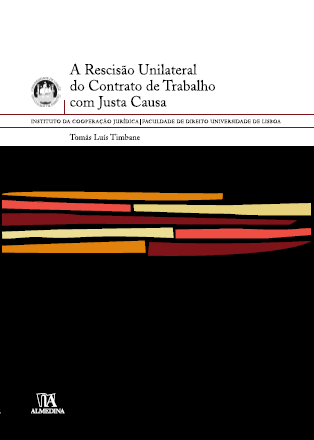
The unilateral termination for cause of the employment contract
Author: Tomás Luís Timbane
Year: 2006
Summary: The work at stake, in addition to being an essential study element of the employment contract system in Mozambique, in particular as regards the termination of the relationship by decision of the employer based on subjective just cause, offers a perspective of the judicial situation and the difficulties arising from the application of Mozambican Labour Law, related to some shortcomings of said law which, despite recent (1998) and generally well designed lacks some improvements, as the author shows. To study the termination of the employment contract in the Mozambican system it is thus indispensable to read the thesis of Tomás Timbane, in which, in addition to the general issues related to the termination of the employment contract – compared to Portuguese and Brazilian Law -, he presents a complete explanation of the Mozambican system in light of the law in force and he critically discusses the legal distinction between dismissal and termination for cause. We should note that the thesis demonstrates an adequate knowledge of the specific problems of the employment contract in Mozambican society, examining the legal solutions thoroughly. The work now being published not only dignifies the School of Law where the dissertation was presented and discussed, but it also represents a milestone of great importance for the beginning of the dogmatic processing of labour issues in Mozambique, contributing to a better understanding of the system and to its potential improvement. […]
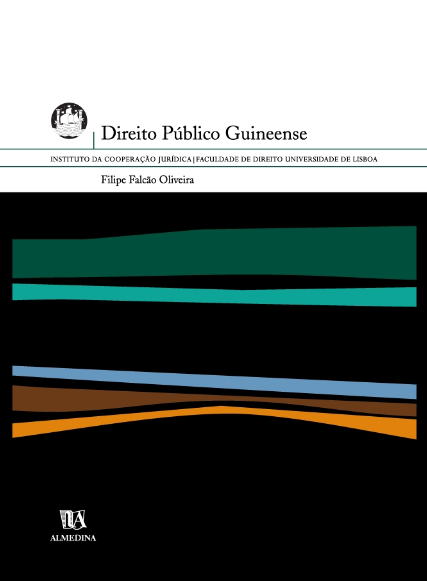
Author: Filipe Falcão Oliveira
Year: 2005
Summary: The book demonstrates an adequate knowledge of the main constitutional systems as well as their projection in Africa. It contains valuable references to the institutions of Guinea-Bissau before and after independence. And it thoroughly examines the municipal model, economic regulation, the State’s business sector and other areas of relevance to the development of the country as well as the guarantees of individuals (e.g., regarding enforcement of judgements against the Public Administration). It also presents and densifies in legal terms a first framework for the administrative activity, in a background where colonial legislation rules. Without stepping away from the study of the African and Guinean specificities, Filipe Falcão Oliveira maintains fundamental and central references to the Portuguese doctrine and establishes, at every step, the parallel between the Guinean and Portuguese Laws, underlining their differences. The author also makes extensive incursions into the constitutional law of the other Portuguese-speaking countries. […]
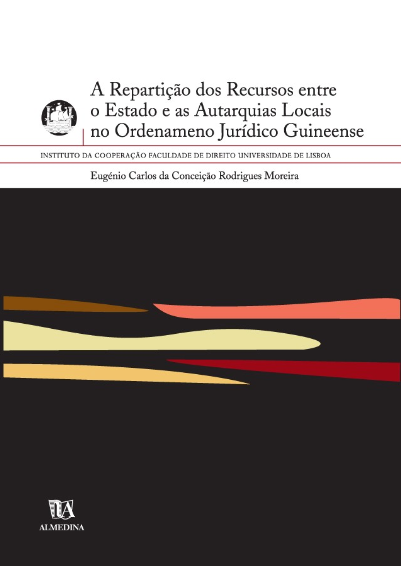
Allocation of resources between the State and Local Authorities in the Guinean Legal Order
Author: Eugénio Moreira
Year: 2005
Summary: The work now published has, to begin with, the merit of reflecting on a reality – that of Guinea – little known and insufficiently developed. Despite having been completed in 2000, it remains relevant, given that the instability of the political situation in the country prevented any significant change of the data the author worked. If, as I mentioned, it is a study with a strong analytical component of the Guinean reality, it is inevitable that, at least one section has a strongly descriptive character. I do not believe, however, that this gives rise to any diminished interest or diminished quality of the work; rather, it seems to me that that is a necessary basis for consideration of any issue of public finances. The thoughts made herein are linked to one of the major issues States face these days, which is to determine the optimal degree of decentralization, namely in its revenue distribution component, as well as, necessarily, public expenditure. […]
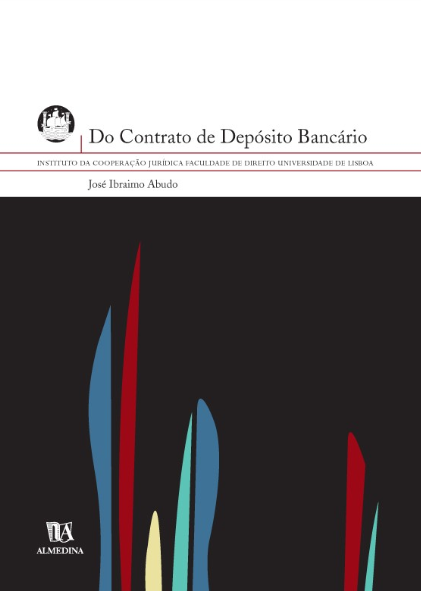
Author: José Ibraímo Abudo
Year: 2004
Summary: The publication of a monograph on the bank deposit agreement is always a fact hailed by Portuguese-speaking Private Law professionals A hot issue in the daily life of communities, courts and legal science research institutions, the bank deposit embodies the Living Law of our days. We live in an environment where Private Law is under reform. The Brazilian Civil Code of 10 January 2002 rebuilt a normative fabric, unifying that country’s Private Law. Important initiatives are under way in Mozambique and are being drawn up in Portugal. Similar movements took place in Macao and Cape Verde, and they are expected to occur in Angola, Timor and Guinea. In short: the great family of Private Portuguese-speaking Laws is preparing itself, in the best way, to lead the communities of the this now starting century. Reconciling public service of the highest standard with the advanced study of Law and with in-depth consideration of legal topics, JOSÉ IBRAIMO ABUDO becomes creditor of an important exchange between fraternal Private Laws. Of greater interest are also the appropriate references he makes to Islamic Law, whose cultural and practical role will not stop growing. […]
